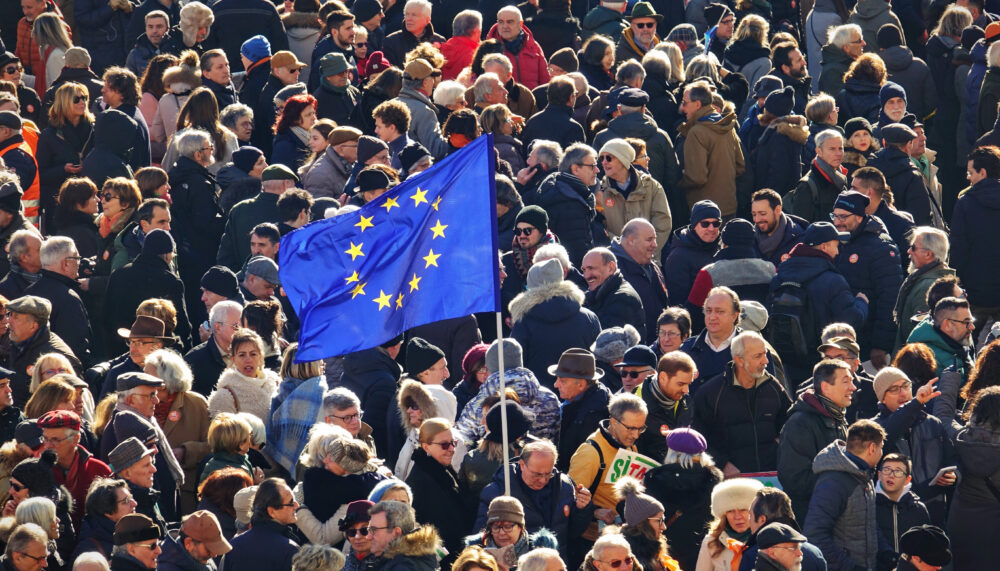CURRENT PROJECT
Strengthening EU external support for democracy (EMBRACE)

The cross-regional collaborative research project analyses blockages to democratisation and identifies ways to overcome them across the wider European neighbourhood.
Timeframe: 2022 - 2025
The research project EMBRACing changE (Overcoming Blockages and Advancing Democracy in the European Neighbourhood) aims to respond to the counter-democracy trends after the coloured revolutions and the Arab Spring. It does so through an inter-disciplinary, multi-method and cross-regional assessment of both blockages to and drivers of democratisation in 12 case study countries across Eastern Europe, Southern Caucasus, Western Balkans, Northern Africa and the Middle East.
Together, 14 international partner institutions will develop innovative policy tools to improve the European Union’s capacity for democracy promotion, from above – through institution-building and collaboration with reform-minded elites, and from below – through engagement with civil society, social movements and popular uprisings. Over the next 3 years, the consortium will receive EUR 2,8 million € funding from the European Union’s Horizon Europe Framework Programme.
Background
The main objectives of EMBRACE are to:
- Advance evidence-based knowledge on blockages to democratisation in the European Neighbourhood and ways to overcome them based on locally-owned solutions;
- Strengthen the capacity of policy-makers and local stakeholders to incentivise resilient political actors to embrace democratic change, and enhance partnerships for a stable and secure European Neighbourhood in which democracy can flourish.
The distinctive methodological feature of EMBRACE as a collaborative research endeavour is its emphasis on the combined used of quantitative and qualitative comparative research methods for the empirical study. Quantitative methods will include a large-n analysis based on a new dataset assessing the effects of EU instruments and the impact of internal and external blockages on democratisation. Qualitative fieldwork methodologies will include stakeholder surveys, in-depth expert interviews, ethnographic interviews, focus group discussions, and participation in formal and informal interactions.
The empirical enquiry will encompass rigorous structured, focused in-depth case study analysis on episodes of deadlock and opening in 12 selected countries in Eastern Europe, South Caucasus, Western Balkans, Northern Africa and the Middle East (Ukraine, Belarus, Georgia, Armenia, Azerbaijan, Serbia, North Macedonia, Bosnia and Herzegovina, Tunisia, Algeria, Lebanon and Palestine). Intra- and cross-regional comparison is systematically included in EMBRACE’s research design.
The case studies will be structured along four main thematic clusters:
- Configurations for democratic shifts after popular uprisings
- Democratisation and economic modernisation in authoritarian and hybrid regimes
- Blockages to democracy and peace in post-war contexts
- Spheres of influence between major geopolitical powers
The project will seek to enhance participatory knowledge co-creation through a collaborative research design. The case studies are led jointly by universities or think tanks located in each of the respective regions, and by external academic institutions located in the EU and the UK with thematic and regional expertise. Additionally, to ensure that EMBRACE responds to real needs and pursues a context- and partner-sensitive approach, practitioners, policy-makers and prominent critics from EU bodies and fieldwork countries will be involved from early stages of the research endeavour. Regular stakeholder committees will be convened in each of the five regions in order to engage key social actors throughout the project. This will allow the integration of local perspectives on democracy from various stakeholders, and the adjustment of a ‘liberal democracy’ approach to less contested and more inclusive forms of democracy.
Finally, the project will develop an innovative set of tools and policy guidance, including a participatory approach which enables improved democratic governance and EU democracy promotion programming. In order to maximise the long-term impact of EMBRACE the results will be collaboratively exploited for further research, capacity-building and policy-making. The project involves the creation of digital open access tools, media podcasts and a knowledge-exchange network that is sustained for capacity-building and empowerment of citizens across the EU Neighbourhood to enable mutual learning and community resilience.
Partners and Funding
Under the coordination of Berghof Foundation, the project consortium consists of the following partner organisations:
- Konstanz University (Germany)
- University of Lleida (Spain)
- University of Maastricht (Netherlands)
- Stockholm University (Sweden)
- University of Gent (Belgium)
- Elliniko Idryma Evropaikis kai Exoterikis Politikis (ELIAMEP) (Greece)
- Arab Reform Initiative (ARI) (France, Tunisia, Lebanon)
- Ukrainian Association of European Studies (Ukraine)
- Ilia State University (Georgia)
- University of Belgrade (Serbia)
- PalThink for Strategic Studies (Palestine)
- Concentris research management GmbH (Germany)
- University of Manchester (United Kingdom) – associated partner bringing their own funding
This project is funded by the European Commission’s Horizon Europe research and innovation programme under grant agreement ID: 101060809

Related publications
- Sergio Rodríguez Prieto, 2022: Attentive, assertive, supportive. EU support to nonviolent movements.
EMBRACE podcast
In this series, activists, advocates, and researchers from the EMBRACE consortium share on-the-ground perspectives from some of the EU’s most critical neighbouring regions. From resisting authoritarianism in Algeria and Belarus, to grassroots movements in Serbia and Tunisia, to navigating geopolitical tensions in Georgia and North Macedonia, to working or democracy during war in Gaza and Ukraine – this podcast brings you personal stories, expert insights, and lessons learned from those at the front lines of democratic resilience.
Updates from this work:
Project lead
Véronique Dudouet
Senior Advisor
email hidden; JavaScript is required
Team members
Karin Göldner-Ebenthal
Lara Azzam
Media contact
You can reach the press team at:
+49 (0) 177 7052758
email hidden; JavaScript is required


